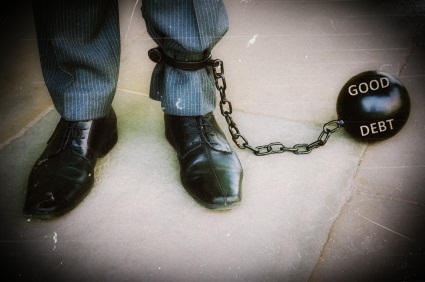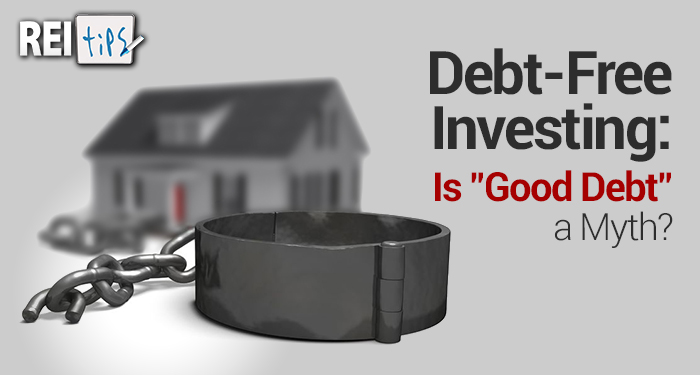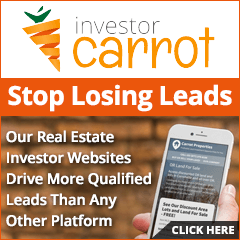Good Debt vs Bad Debt…ever heard of it?
Sure, if you’re like me then you probably learned the now sacred cow “good debt vs bad debt” philosophy in Rich Dad, Poor Dad at some point. And it seems to make good sense, doesn’t it? Good debt vs bad debt 101 tells us…- Bad debt is debt accrued on “stuff”, like toys, vacations, fancy cars, etc.
- Good debt is leveraged debt that you use to make you money. Like when you borrow from a lender to purchase houses that earn you positive cash flow.
In fact I’d say “Good Debt vs Bad Debt” tends to be a cornerstone philosophy for more investors than not today. However…
Good Debt vs Bad Debt: What if We’ve Got it All Wrong?
Could it be that “good debt” we’ve grown to appreciate and pursue, is really just more bad debt in disguise?
 Consider this: These are certainly trying times for many, and we’ve probably all heard of big, successful investors who found themselves belly up in the last couple of years, right?
Consider this: These are certainly trying times for many, and we’ve probably all heard of big, successful investors who found themselves belly up in the last couple of years, right?
Right now I’m thinking of two of the biggest investors in my neck of the woods once upon a time — guys I used to wholesale a large number of my deals to — who aren’t even in the game anymore. And this can be found everywhere.
So what happened?
Now consider this: Have you ever heard of a debt free investor going out of business?
Me neither. Kinda makes you think, doesn’t it?
If like me, you’ve ever bought into the “good debt vs bad debt” myth (and yes, I do believe it’s a myth at this point) then I have a short, paradigm shifting video for you to chew on. And whether you agree with me or not, I guarantee you’ll find it thought provoking.
You’ll hear about three different folks who have wrestled with this very “good debt vs bad debt” issue. All of them are savvy, successful real estate investors who earn great money through lots of profitable deals…
- A well known, big name flipper with 4.5 million in “good debt” to contend with
- Another big investor with 1,100+ solid rentals in his portfolio (all “good debt”)
- And third who’s average yearly income hovers around half a million or so, who somehow can’t scrape by on less (thanks to “good debt”)
I submit to you that only one of them is really successful. The other two are slaves in denial of their slavery, but living steeped in it nonetheless. Whether they realize it or not, most every decision related to finances, time, life and personal freedom is, in fact, dictated by their “good debt”.
Are You an Unwitting Slave to “Good Debt”?
Have you been drinking the good debt vs bad debt Kool-Aid? Leave your preconceptions at the door, and see what you honestly think… (and feel free to LOL when he tells the guy at 7:43, “Ya know, you’re nothing but a FAKE.” 🙂 )
Good Debt Vs Bad Debt Debunked
I hope the short video above challenged you like it did me. I no longer believe in “good debt vs bad debt“. It’s more like “bad debt vs worse debt vs no debt”.
What are your thoughts after watching the video above? Agree or disagree? I welcome your comments below.
My best,

PS – If the idea of debt free investing intrigues you, then I highly recommend you check out the Debt-Free Investing workshop with Shaun, Steve and Joe. Really good stuff, and very reasonably priced.






Sean & JP… Great start and keep it rolling… With the US all inclusive debt level at somewhere around 114 trillion dollars, along with an unsustainable budget of 3.67 trillion, it doesn’t take a rocket scientist to figure out that debt isn’t the way to go. For me personally, I never had a debt issue until age 45 when I jumped into the RE game and proceeded to lose everything I had built up over the preceeding 20 years and have yet to climb out of that hole. There is not a day go by that I don’t think about how to get out of debt, but I have learned that borrowing money is at best a temporary fix to a problem that is consuming individuals in search of the American dream of financial freedom. As with some, if not most, I am skeptical that a remedy for debt truly exists, but I am game to hear about anything that may give a glimmer of hope…So bring it on..:-)
ps – the only one that comes out a head in a debt monetized society is the lender – never the borrower. This is why banks continue to exist. They exist strictly upon the collateralized debt of its account holders that have been leveraged ten fold via banking charters approved by our Federal government and controlled by the non-government entity of the Federal Reserve banking institution. Get rid of debt monetization and fractionalized lending at the government and public banking level, then our country just might have a chance of digging itself out of debt. However, after reading such books as “Aftershock” written by David Wiedemer (Economist, PHD), I would say the chances of this happening are slim to none within my life time and/or if the USA even continues to exist or survive in it’s former glory…:-)
There is no such thing as a good debt. All debt is bad
Interesting video post, thanks for the iconoclastic take on “good” debt. I can definitely see the destructive power of too much debt, but also agree with the many of the other posters who think that it would be be nearly impossible to achieve any significant accumulation of assets without borrowing the money to do it.
Maybe part of the problem is our fixation with the 30 year, SLOW amortizing, mortgage. You talked about the overloaded investor who was waiting for his payoff “twenty years out” — maybe that’s the crux of the issue.
I wonder if retraining ourselves to analyze deals through the lens of shorter-term debt wouldn’t alleviate the problem. . .
Good thoughts…but what if you could realistically accumulate 10-20 rentals in a couple of years with no debt? There’s a way this can happen…and no, it doesn’t require a big bag of cash. It requires partners and the right framework/model. It’s pretty darn swift actually.
…jp
People are losing everything because of debt, mostly because they made investments they couldn’t afford to make or took loans they couldn’t afford to pay back. Either way, staying debt free is certainly the best policy.
Debt like anything else is a tool. It must be used wisely and properly. ‘Good debt’ works and works very well BUT you have to have cash reserves, room for a rainy day (or months really) and ensure it is setup property and protected. It takes education first and foremost. Buying all real estate debt free is great and certainly ideal. However, it is difficult in many markets even today because most people don’t have the cash to pull off the numbers and aren’t willing to (wisely in most cases) to invest in lower priced areas. In these scenarios, you can get some fantastic returns (30-95%) by leveraging good debt properly year over year.
IMHO, debt is not usually what brings people down. Lack of education and/or commitment to excel is what ultimately brings people down.
There is no such thing as good debt or bad debt, just as there is no such thing as a good gun or a bad gun. It is a tool that can be used for either. Highly leveraged is very dangerous. No leverage is very conservative. The answer, like most things in life, probably lies somewhere in between.
HI, Mccabeohio – I agree about the gun, but not the debt. I’m not saying all debt is evil…but it all comes with baggage. Even “good debt” brings with it some amount of slavery to the lender. And that slavery may not be felt until the first payment is in threat of being missed…but it’s there nonetheless. Something to think about. Thanks for commenting!
As we all know, your ROI (return on investment) goes up dramatically with leverage in real estate. 10% down on a $50K rent house is a $5K investment. If rental income is $700 a month and your mortgage payment (PITI) is $400 a month, that leaves you with $300 a month cashflow or $3,600 a year. $5K investment and $3,600 a year profit is a 72% return on investment. This does not even account for: 1. Equity capture on the buy. 2. Market appreciation (if you get it). 3. Forced appreciation via improvements. 4. Principle pay down / equity build-up.
Now lets look at the cash buyer: $50K rent house with $50K invested with $700 a month rent. You would still have taxes and insurance, so let’s say that’s $150 a month. 700-150= $550 per month = $6,600 a year profit on a $50K investment. That’s a 13% ROI. Not bad, especially compared to a 1-2% CD. But I’m liking the 72% return too!!! Heck, why not have the tenants buy the house for you?
On the negative side, if the market your leveraged investment property is in declines 10%, you’ve “on paper” lost your entire $5K investment based on the above numbers. Leverage works both ways! This is why I would never suggest that anyone buy a rental property that does cashflow. Investors buy assets that consistently produce a return, speculators gamble on probabilities.
I’ve been told, and I think wisely, that if you’re in the early aquisition stage of your business whereby you are aggressively stacking properties in your portfolio, leverage can work greatly to your advantage. But as a word of warning, WHAT WORKS FOR ONE PERSON CAN BE DISASTEROUS FOR ANOTHER. We learned this lesson when everyone was touting the “Pull all the equity out of your personal residence with a home equity line of credit (HELOC) and put that money to work for you.” Well, that worked great for some, and many others ended up losing their homes. This, of course, was mostly due to making poor choices on what investments to make or simply in buying more liabilities, not assets.
Hope this post helps someone!
I forgot to mention in my last post that with $50K cash, instead of putting it all down on one house you could leverage and buy about 7 $50K rent houses with 10% down. Then your $3,600 positive cash flow is multiplied by 7, equaling $25K per year. Additionally, your other four benefits would be increased 7 times. Remember, you cash purchase of one $50K home will return about $6,600 a year. It’s the same $50K, only in one model we get around 6K income and the other model we get around 25K.
(Sorry for the typo in the last post! I meant “never buy a rental property that DOESN’T cashflow.)
OK You are spot on . I went to a real estate seminar in California more than 2 decades ago and his words changed my life forever. He said live with in your means and use the bank as your partner in acquiring your purchase using FHA to start. Federal Housing administration.
Then the next thing he said was to leverage the dept. in your favor by purchasing and holding to build equity Then and only then when your financial climate is sound do it again.
I should have continued this strategy and I would be a multi millionaire by now but I did ok.
Best property advice I ever received.
Warmly Barry Anderson aka Barry Gourmet & Raw
I LOVE This!!! This is the FIRST I have found that say’s it all right!
My Husband and I (neither have college degrees) also read the Rich Dad Poor Dad book after we purchased our first home 2001 on OWC terms with 10% down. We were 26 years old when we purchased it and that was all we could find since our credit was shot. We lived like poppers even going without cable television. No vacations , just hard work fixing up the 25 year old run down home on our own with very little help and certainly no financial help as both of our parent’s barely survived themselves. We learned most things off of YOUTUBE such as plumbing, electrical you name it. We soon discovered the owner of our home had many homes and was looking for a new helper. Needless to say that’s how we got our start and we never earned more than $24000/year for the following 6 years. (my husband was nothing more than his property manager/maintenance guy). But all the while we were receiving a hands on FREE education. The Investor also told us “There is NO SUCH THING as GOOD debt”. He drilled that in our heads. All our families thought we were nuts and being taken advantage of when we would say “We are getting a FREE education”! As we watched family members and extended family member sink deeper and deeper in debt we would often try to offer advice but they just laughed and mocked us. (can you guess what’s going on with most of them in today’s economy?) By the end of the 6th we obtained our first free and clear home. It has been 11 years since we started we have never used Bank $ and own ALL our properties FREE and clear. How did we do this? Living like poppers, that’s how. And we never received any aid from the Government along the way either. We chose Food Bank’s ( a more dignified option) verses Food Stamps when times got real tough. We Have No business partners. We did try that once but the partner did not have the means or time to give his half in replacing a roof. That was the only time and only property we ever went in halves on. My husband was lucky I was raised extremely conservative as most women now in days have champaign taste on a beer budget and I was lucky he had the endurance and patience that a lot of men don’t have to create this machine we now have today and built as team with our 3 children watching and learning and taking part all the while.
Over all debt is generally bad! Depending on markets and timing, debt can be very useful to help one propel. However, given current economic conditions debt is a death sentence. I do believe at some point in time the world will see economic circumstances it has never seen before. It will wipe out anyone caught holding debt. I buy affordable homes for cash. Then I rent them or in some cases I’ll even finance them. Owning these home debt free gives me tremendous flexibility and creates wonderful profits. I am very passionate about growing my business debt free as I believe during economic hardships, debt free businesses will thrive. How to buy assets debt free? 1. Live below your means. 2. Save your earnings consistently. 3. Educate yourself in your particular investment field thoroughly. 4. Exercise an incredible amount of patience.(may take you years and years of persistent hard work) 5. Never, I mean Never take your eyes off the ball.
Wow, what a great story, Felicia! Thanks so much for sharing it! And I’m thrilled to hear you guys have worked so hard and sacrificed so much while everyone else around you was living above their means…and now you’re starting to see it all pay off. Awesome! Thanks for commenting!
Truth, Ben. Truth. And what an EXCELLENT 5-step plan. Thanks.
I stumbled across this article, and thought I would contribute my two-cents worth.
First, let me say that I am a real estate investor with 20 years of experience, own a decent-sized (~1500 unit) property management company, and have an MBA with numerous graduate-level finance classes under my belt. That said, here is my take on debt, as it relates to real estate investments.
Any capital investment, whether a small rental property or a billion dollar factory requires capital. That capital can only come from two places: equity and/or debt (or put another way, your money or someone else’s money). The mix of equity and debt is what is known as the “capital structure” of the investment.
Capital comes at a cost. With debt, the cost is interest. With equity, the cost is whatever else you could have done with the money (opportunity cost). Typically people demand a higher return on their equity than the bank does for debt. The bank might be willing to give you a 5% mortgage, but you expect a 10% return on your investment. The difference is known as an equity-risk premium. The reason this can happen is because, legally, debt gets paid off first so it is less risky to the lender — the bank gets paid first and you get what is left over.
Ultimately, an investor needs to decide on the best capital structure for their properties. This is not a one-size-fits-all decision, because it depends on what you are trying to accomplish. If you are looking for secure income, such as in retirement, then free and clear properties are a good way to go. However, if you are looking to maximize your return on investment, then you must introduce debt into your capital structure (I’ll spare you the math, but it is true).
If you are going to use debt, there are a few things you need to understand. First, is that you have to make sure that the rent from your properties can service that debt with a comfortable margin of safety. If you have 10 units, make sure that you can pay your bills if only 7 of them are rented. Also, have a healthy cash reserve in case something goes wrong. Second, there is a trade-off between debt and cash flow. It is very unlikely that you will find a highly-leveraged property that has a large positive cash flow. If you find one, you are probably making poor assumptions about the operating expenses.
Where the “no money down” crowd goes wrong is that they assume that property values will always rise, and that they can use 100% of someone else’s money to capitalize the investment and service the debt, while accruing 100% of the appreciation to themselves. This is great, until it isn’t (as we’ve seen in recent years).
The bottom line is that some debt — particularly fixed-rate debt — can be a healthy thing to add to your investment portfolio as long as you don’t overdo it. Being over-leveraged can take you down. But being under-leveraged can lead to mediocre returns.
The video is simply anti-debt propaganda. He asks how many debt-free investors go out of business (also pointed out in the article), but let’s turn the question around; how many debt-free investors, successful or otherwise, have you ever heard of? Think on that for a bit.
The main point of the video is simplicity; sell extraneous “stuff”, don’t buy what you don’t have cash for, etc. That’s all well and good, but we all know it’s impossible to get started without taking on some form of debt, for even a little while. And that’s where it all falls apart for our video guy; he states that it’s all relative. Exactly. If you want 1,100 rental apartments and you’re saving aggressively to pay things down way ahead of schedule, why is that any worse than someone earning $60k annually and saving hard to pay down his $100k mortgage faster? In all three examples, the common denominator is irresponsible spending, which is a far cry from calculated investments.
I myself am not a huge fan of debt, but even so this article is in no way appealing.
What an awesome story!! Can I ask how many properties you have now? How did you save the money to pay for them?
Congrats!!!